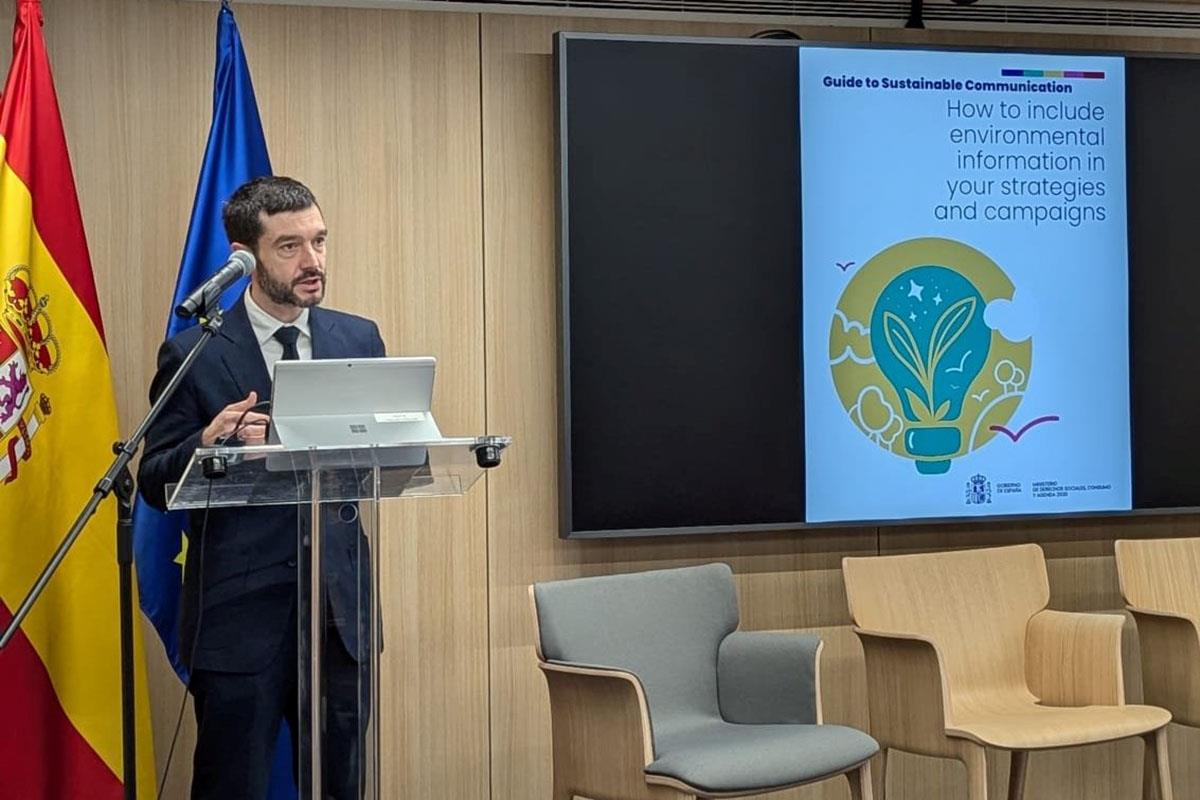 The Minister for Social Rights, Consumer Affairs and Agenda 2030, Pablo Bustinduy, during the presentation in Brussels of the 'Sustainable Communication Guide'
The Minister for Social Rights, Consumer Affairs and Agenda 2030, Pablo Bustinduy, during the presentation in Brussels of the 'Sustainable Communication Guide'
Pablo Bustinduy, Minister for Social Rights, Consumer Affairs and Agenda 2030, presented the Sustainable Communication Guide this Thursday in Brussels, which was launched by the department he heads and which is aimed at companies under the title "How to include environmental information in your strategies and campaigns." The event took place within the European Union and was attended by Isabelle Pérignon, Director General for Consumer Policy of the European Commission, and Agustín Reyna, Director General of the European Consumer Organisation.
This guide, presented by Bustinduy, is a pioneer in Europe and consists of 60 pages that have been translated into English. It provides detailed information on how to identify the greenwashing or "ecoposturing" carried out by some companies, i.e. promoting their products or services as environmentally friendly without scientific evidence to support it.
Pablo Bustinduy emphasised that, according to current legislation, a company that makes unverified environmental claims would be engaging in unfair practices as it would be misleading information for consumers, "and this prevents them from assessing whether the product or service they are buying is really environmentally sustainable."
According to data provided by Spain's Consumer Affairs ministry, 42% of the environmental claims made by companies are questionable, while 58% of the products and services offered as environmentally friendly lack the necessary information to be verified, i.e. 6 out of 10 products. "We have to fight more decisively against 'ecoposturing' and this guide is a good tool for doing so, not only in Spain, but also throughout Europe," said Minister Bustinduy, who said that the right to sustainable consumption "is fundamental." He called on companies to comply with environmental regulations and to provide "truthful information with which they can vouch that they are truly committed to climate targets."
The presentation of this guide was also attended by Andrés Barragán, Secretary General for Consumer Affairs, who highlighted the fact that the document also contains information on the legislation on greenwashing. If a company makes unverifiable environmental claims, he explained, this could be considered an unfair practice in breach of Article 47.1.m of the General Consumer and User Protection Act, and could lead to penalties of up to 100,000 euros, which could exceed these amounts to between four and six times the illicit profit made.
Barragán detailed that the guide also provides information on upcoming changes in terms of legislation, both from the government and from Brussels. And he pointed to two European Union regulatory projects which, in Spain, will be transposed through the future Sustainable Consumption Law:
- Directive (EU) 2024/825 of the European Parliament and of the Council of 28 February 2024 amending Directives 2005/29/EC and 2011/83/EU as regards empowering consumers for the green transition through better protection against unfair practices and through better information.
- A proposal for a Directive on the substantiation and communication of explicit environmental claims ("Green Claims").
On the future Sustainable Consumption Law, Minister Bustinduy said that it would have "a great positive impact on the environment, society and the economy" and that it would favour "the green transition and an environment of confidence for consumption." He also stressed that the law will guarantee that all people can access sustainable products "without depending on their income" and that this right can only become a reality if both companies and public administrations demonstrate their commitment.
In addition, the presentation provided relevant information on this guide:
- According to a study by the European Commission, 80% of websites, online shops or advertisements carry environmental claims. And these certificates have a positive influence on the purchases of 72% of Spaniards, according to research by the Local Production and Sustainable Consumption Observatory.
- Based on a report by the Consumer Protection Cooperation Network, 42% of environmental claims are dubious and 57.5% do not provide sufficient information to be verified.
- A study by the analysis centre Funcas concludes that nearly 80% of Spaniards are very or fairly concerned about the threat of climate change, and nine out of ten Europeans consider it a serious problem according to Eurobarometer data.
The presentation of the guide also highlighted the action led by Consumer Affairs from Spain, in coordination with the European Commission, against 20 airlines that have made unverifiable environmental claims, and whose information is being monitored together with other national authorities of the CPC Network (European Consumer Protection Cooperation Network). As early as April 2024, a warning was issued to these 20 airlines of the changes they had to make to ensure compliance with current ecoposturing regulations. These airlines are currently in dialogue and have been warned that, should they fail to resolve the problems identified, the CPC Network authorities may take further measures, including financial penalties.
Non official translation




